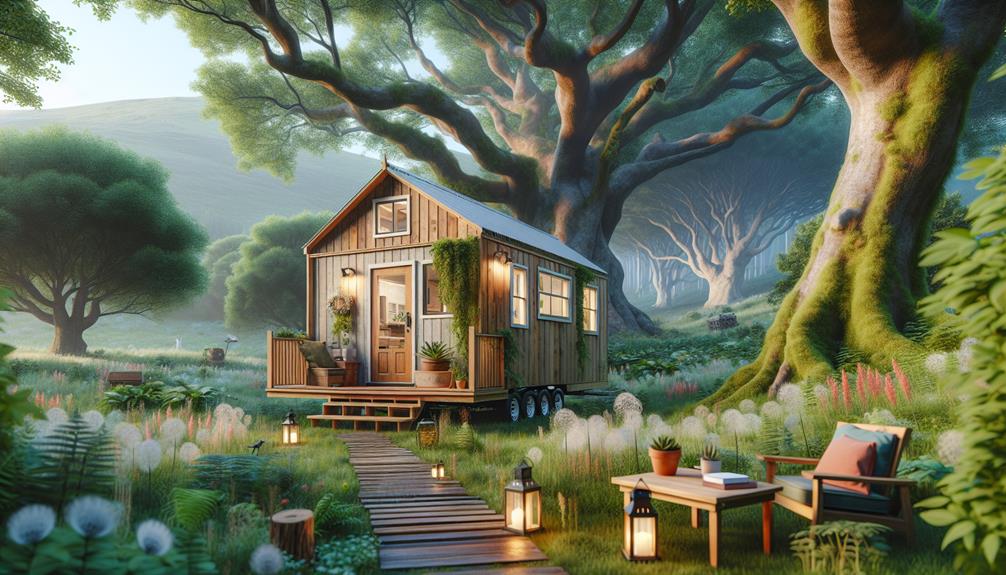You might not be aware that the average tiny home boasts an occupancy rate that rivals traditional vacation rentals. As you explore the emerging market of tiny home rentals, consider the implications of joining a movement that's not just about minimalist living but also about creating unique experiences for a growing demographic.
The demand for eco-friendly and affordable travel options is on the rise, and with the right approach, you could tap into a niche that promises both profitability and a smaller ecological footprint. However, before you leap into this business, you'll need to navigate a few hurdles, including zoning laws and financing.
Uncover how these obstacles can be turned into stepping stones for success, and what strategies could set your tiny home rental apart in a competitive market.
Key Takeaways
- Conduct thorough market research to understand demand patterns and preferences of target demographics.
- Familiarize yourself with local zoning ordinances and ensure compliance with specific codes and permits.
- Develop a detailed business model that evaluates potential profits, upfront costs, and market adaptability.
- Implement effective marketing strategies such as utilizing social media, collaborating with influencers, and securing positive reviews to attract guests.
Understanding the Market Demand
To capitalize on the burgeoning tiny home rental market, it's crucial to dissect and comprehend the demand patterns across diverse locales to pinpoint burgeoning hotspots.
You'll want to delve into the preferences of your target demographics, including eco-conscious travelers and budget-friendly vacationers, to shape an enticing rental experience.
By analyzing the competition and occupancy rates, you gain insight into the vacation rental market's vibrancy and your potential slice of the pie.
Aligning your tiny house rental business with the pulse of travel trends ensures relevancy and appeal.
Don't shy away from leveraging surveys or focus groups; they're vital in tailoring your offerings to meet the nuanced desires of future guests.
Navigating Zoning and Legalities
While understanding market demand is fundamental, you'll also need to navigate the complex web of zoning laws and legal requirements crucial for establishing your tiny home rental venture.
Tiny house living is gaining traction, but the rules and regulations can be stringent. Delve into local zoning ordinances to ensure your rental property adheres to specific codes, including square footage and utility stipulations. If you're aspiring to create a tiny house community, it's imperative to determine if special permits are necessary.
For added security and investment protection, consider forming an LLC or corporation. This step not only safeguards your assets but also enhances the credibility of your tiny home business.
Across the United States, these legalities aren't uniform, so a meticulous, data-driven approach is essential for your entrepreneurial success.
Planning Your Business Model

Crafting a detailed business model, you'll need to weigh the potential profits against possible losses to ensure the financial viability of your tiny home rental venture. When planning your business model, consider the unique aspects of running a vacation rental. Your tiny house investment should be analyzed through a data-driven approach, evaluating both upfront costs and potential passive income.
Here's an analytical breakdown:
| Investment Property | Short Term |
|---|---|
| Tiny Home Investment | High ROI |
| Vacation Rental Owner | Market Adaptability |
| Tiny Home Vacation Rental | Innovative Guest Experience |
Your business should pivot towards niches that offer high return on investment (ROI) and adaptability to market trends. Fostering an innovative guest experience can set your tiny home apart in a crowded market. Remember, success in this business hinges on meticulous planning and strategic execution.
Marketing Strategies for Success
Having established a solid business model for your tiny home rental, it's crucial to focus on implementing marketing strategies that maximize visibility and attract a steady flow of guests. In a market buoyed by the tiny house movement, innovative marketing strategies are vital for your vacation home to stand out.
Utilize social media and rental platforms like Airbnb to showcase your unique living space. Collaboration with influencers can catapult your tiny home rentals into the spotlight, serving as a lucrative business opportunity.
Data-driven content that highlights your rental's unique amenities will resonate with potential guests. Moreover, flexible rental terms and seamless communication are instrumental in securing positive reviews and referrals, turning your short-term rental into a smart investment.
Managing Operations and Maintenance

To ensure your tiny home rental thrives, meticulously manage operations and maintenance. This includes implementing a streamlined check-in process and diligent property upkeep, which are essential for consistently high guest satisfaction and long-term success.
As the tiny house movement grows rapidly, staying ahead in this relatively new market means leveraging data to optimize the balance of water and electricity usage. This is key to maintaining low costs and maximizing profitability.
Implementing a robust system for handling cleanings and turnovers is crucial to maintain the allure of your tiny houses. Consider partnering with a specialized property management firm to ensure efficient and reliable cleaning services. This not only enhances the guest experience but also protects the value of your property, confirming tiny home rentals as a good investment.
It is also important to stay informed on legalities and regulations. Ensure that your business opportunity complies with all relevant laws and regulations. This not only protects the interests of tiny homeowners but also ensures a safe and secure experience for your guests.
Frequently Asked Questions
Are Tiny Home Rentals Profitable?
You'll find tiny home rentals profitable by analyzing market demand, investment costs, and zoning challenges. High occupancy rates, especially with seasonal trends, and a focus on guest experience and sustainability can boost profitability.
Can You Use a Tiny Home as a Business?
You can leverage a tiny home for diverse ventures, from mobile offices to pop-up shops. Navigating zoning, licensing, and rental regulations is crucial to tap into minimalist living and eco-tourism's growing appeal.
How Successful Are Tiny Home Airbnbs?
You'll find tiny home Airbnbs thrive with high guest satisfaction and unique appeal. Optimal location, smart marketing tactics, and dynamic pricing strategies often outweigh operational costs and seasonal trends for favorable investment returns.
How to Start a Tiny Home Airbnb Business?
Starting your Airbnb business demands understanding zoning laws, scouting locations, and ensuring compliance with building codes. You'll need to analyze investment costs, devise innovative marketing strategies, and curate amenities to enhance the guest experience.
Conclusion
In the realm of tiny home rentals, you're not just offering a place to stay; you're providing a key to a simpler, sustainable lifestyle. Imagine this: with every reservation, you plant a seed of change, nurturing a green footprint in the travel industry.
Data shows high occupancy rates mirror this blossoming trend. Your investment isn't merely a business—it's a fertile garden, yielding both profit and progress. Tend it well, and watch your tiny empire grow.

